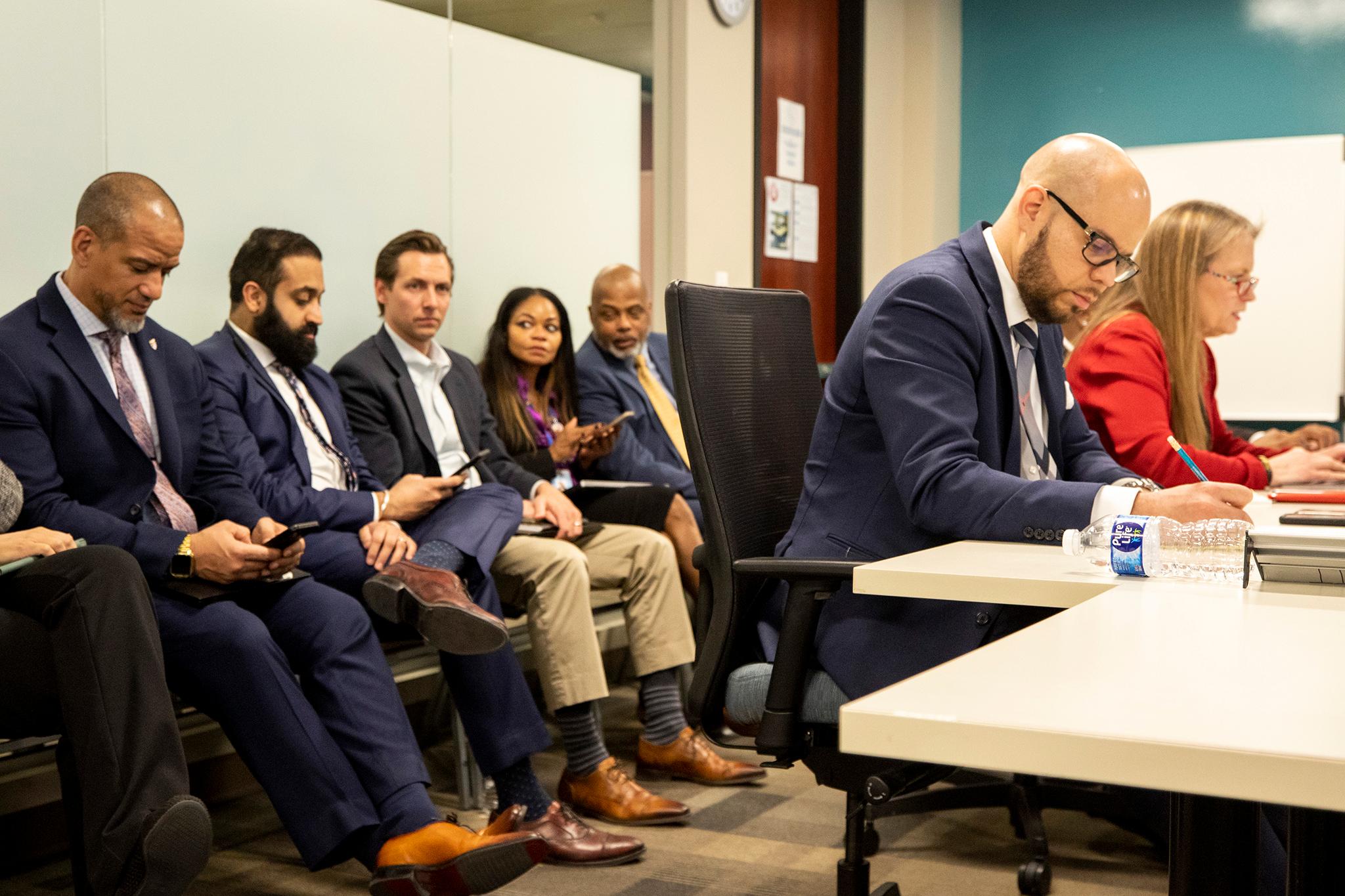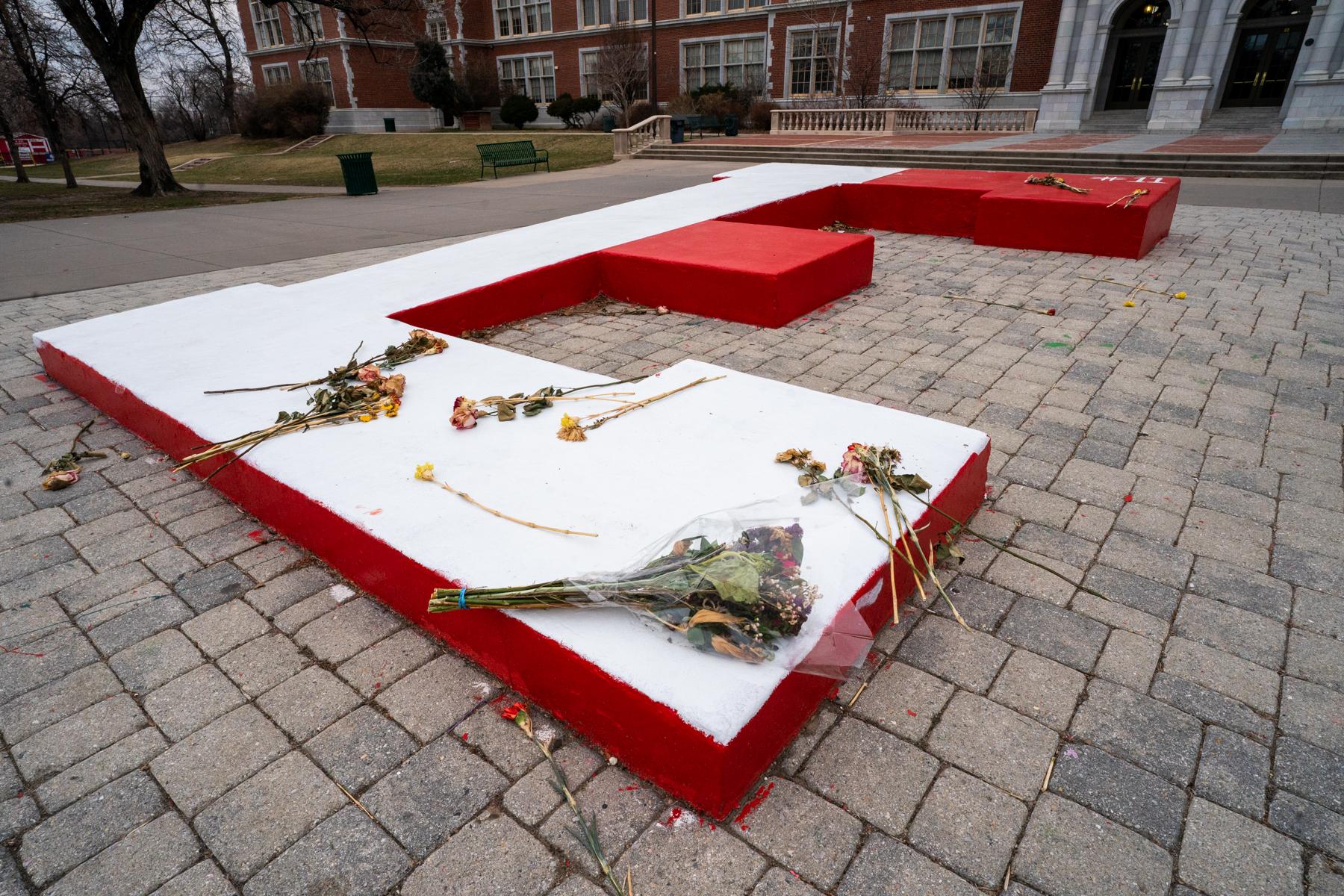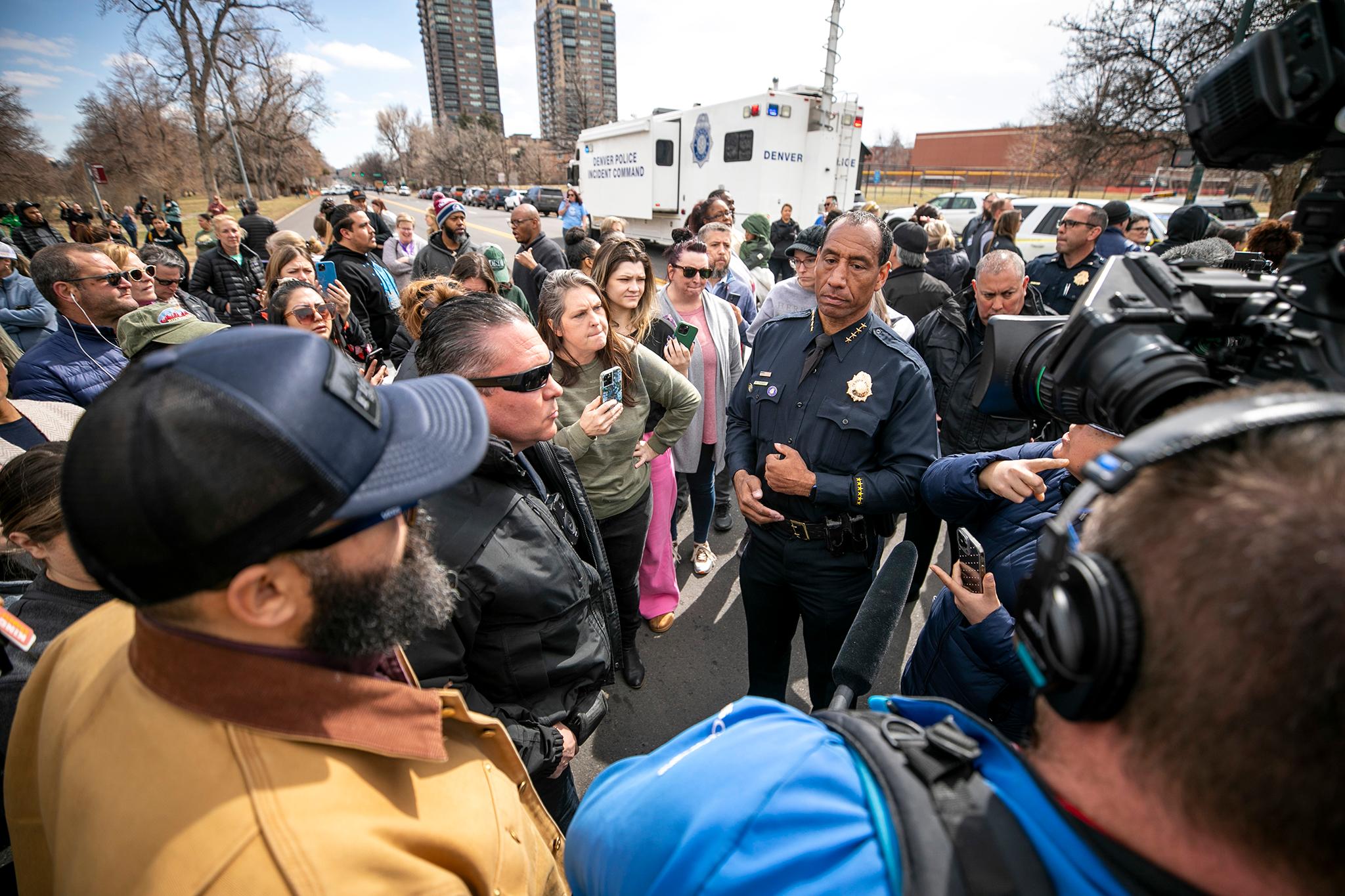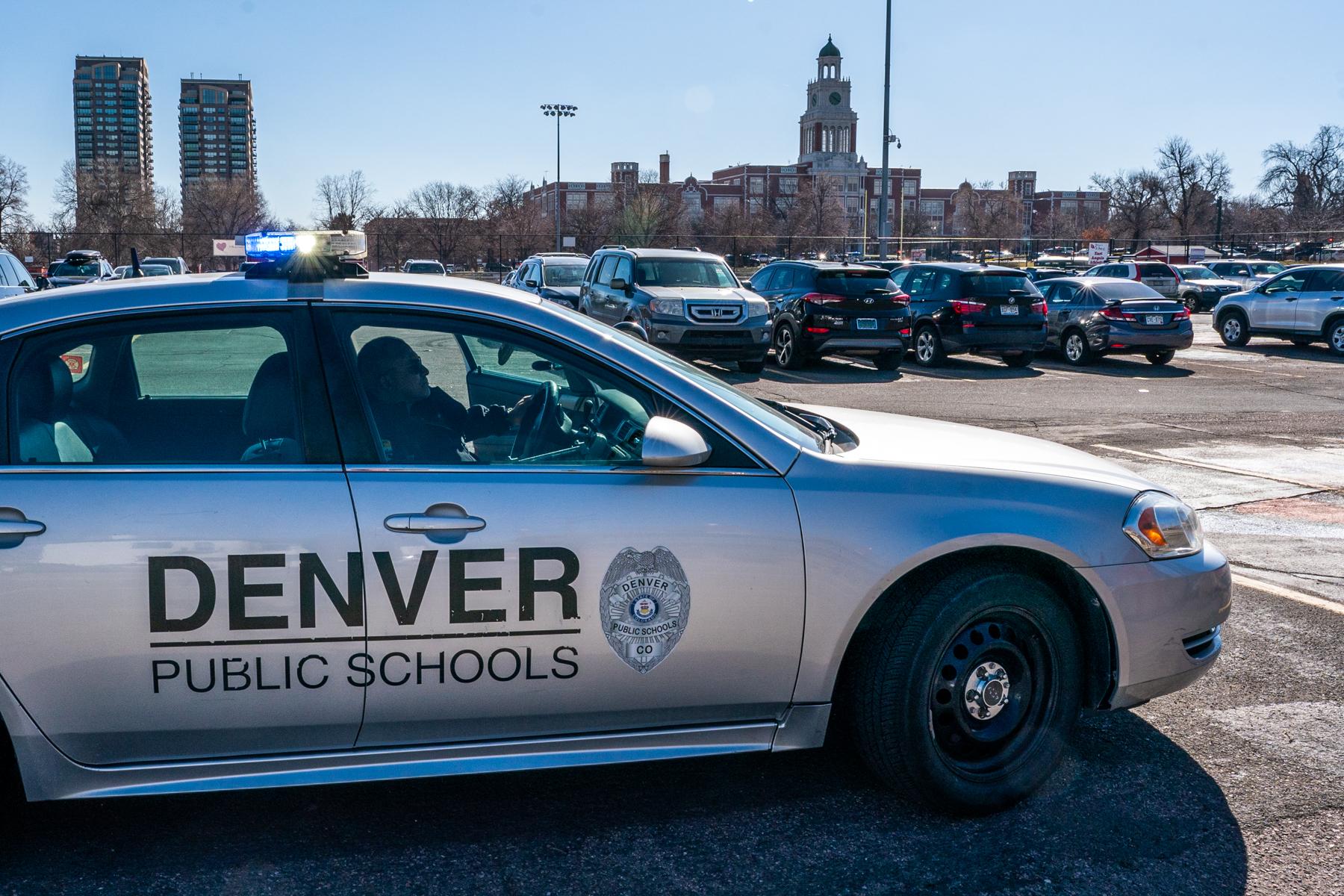Updated at 6:46 p.m. with community reaction and context about past interactions with police in school.
In 2019, Denver Public Schools safety officials handcuffed a seven-year-old at a Green Valley Ranch elementary school. Police pointed a gun at a teacher during a search at Rise Up Community School in 2018, prompting students to stop attending class as they didn't feel safe.
Tools like metal detectors gave officers the chance to search a student's belongings and catch them for small infractions that sometimes led to arrests or worse.
Black and Latino children were statistically the most likely to face consequences, ranging from tickets to arrests, and so justice-minded parents and advocates successfully pushed to remove those officers from schools in 2020, arguing that police were not actually keeping kids safe in the classroom.
But after Wednesday, when a 17-year-old East High school student, who had a previous weapons charge and had been expelled from Cherry Creek's Overland High, shot two deans at East High School and later killed himself, parents, students and educators are asking how officials can keep them safe while at school.
Some want armed officers and other strict security measures back in school hallways. Others, who remember why officers were removed in the first place, think putting them back in classrooms would be short-sighted and won't solve the greater issue at hand.
Still, on Thursday, the Denver School Board moved forward and unanimously agreed to allow as many as two armed police officers at high schools across the city in light of the shooting. Board members tasked DPS Superintendent Alex Marrero to work with Mayor Michael Hancock to provide external funding for the officers, as well as mental health professionals.
"Is it the fix? We do not know," Marrero said. "We know that going back to extremes isn't the solution, but this is the right way forward."

The move kicks off what is sure to become a heated debate over the next few months about how to keep students safe in Denver classrooms -- and what those plans will actually include, like armed officers, metal detectors and mental health resources.
East High has experienced multiple occurrences of gun violence this school year. In February, 16-year-old Luis Garcia was shot outside the school.
He died from his wounds in early March, which led to student protests calling for gun safety legislation from lawmakers. They did so again Thursday.
Fears remain high that students are simply not safe, and the latest debate over school resource officers shows a clear split on whether armed officers are the solution or another problem.
The removal of officers was not a decision made lightly, but it was one many saw as necessary to keep kids from negative police interactions after the murder of George Floyd in 2020.
The concern for many reform-minded parents and advocates is that the return of officers will lead to more of what was seen in the past.

Between 2014 and 2019, in-school officers had ticketed and arrested more than 4,500 students. Of those, 80% were Black and Latino, according to data from Padres y Jovenes, a group that spent decades trying to get cops out of schools and reform disciplinary practices.
The statistics from the activist group were damning evidence that the Denver Public School system was mired in systemic racism and criminalizing students of color.
"When people talk about SROs and police, I get it," said Tran Nguyen-Wills, an East High parent. "For me it is a sense of safety, but it's also just a Band-Aid and America is really good at putting on f****** Band-Aids for everything...We took out the SROs and police, but we never put something else in place...There are things we could have done to replace that false sense of security we have with police and SROs. We saw what happened in Uvalde, where they had SROs and they had militarized police and children still died."
Some argue that interactions with officers in schools funneled Black and Brown youth through the school-to-prison pipeline or led to negative interactions with police.
"I look at some former students who are incarcerated, and you can see where the pipeline to jail began," said Manuel Aragon, a parent of Denver Public Schools children who worked in the school district for 11 years. "It began with truancy tickets or these things that were overly policed because we live in a society that heavily polices Black and Brown bodies and for the optics of safety rather than for actual safety."
In the summer of 2020, Denver was engulfed in protests against the murder of George Floyd and other high-profile cases of law enforcement killings of unarmed Black people. For many, trust in all law enforcement had been broken. Police -- even school resource officers who had been beloved in certain schools -- were widely viewed as dangerous.
Parents, students and advocates alike made it clear: Get the cops out of the schools before they kill someone.
The Denver Public School Board read the research. The members listened to the advocates and families who experienced police in schools criminalizing their children. In 2020, the school board decided to cut its contract with the Denver Police Department.
"Part of the reasoning for this decision is the belief that the close proximity of law enforcement to students on campuses directly contributes to the school-to-prison pipeline," the district posted online. "Studies show that Black and Brown students arrested for minor school infractions are more likely to end up in the adult criminal system, entrenching the school-to-prison pipeline.
"Our commitment to student safety has not changed," the Board wrote. "There is nothing more important than all of our students feeling safe, cared for, and protected in our schools. Our students need to trust the adults who are on our campuses with them. As we make this gradual transition, we will work closely with school leaders, staff, parents/families and students in the coming weeks to understand and prioritize their needs to ensure the safety of students, staff and communities."
After Wednesday's shooting, East students rallied at the Capitol again, begging for gun reform. Meanwhile, the DPS board was at work in a closed meeting planning to bring armed officers back into high schools.
DPS board President Xóchitl Gaytán, Vice President Auon'tai M. Anderson and Board Member Carrie Olsen read off a memorandum detailing their plan for the rest of the school year.
Two armed officers and two mental health professionals will be at all DPS high schools until June 30.
The board is requiring that the officers be trained "in the use of firearms, de-escalation techniques, policing in a school environment, knowledgeable of the school community they intend to serve and skilled in community policing."
During this time, board members have tasked Marrero with creating a "systemic Long-term Safety Operational plan" that engages with community members. The board also requests that Marrero provide monthly data updates on ticketing and arrests, and that he ensures school staff aren't using the officers for disciplinary issues. His deadline for the safety plan is June 30, 2023.
Marrero put the blame for recent violence on himself and the school board and said they had failed the 17-year-old shooting suspect.
"These events should not have happened on my watch or on this Board's watch," he wrote in a memo to the board, after the shooting.
Aragon, Nguyen-Wills and former DPS teacher Tim Hernandez believe Marrero and the board are having a "knee-jerk reaction to the shootings. Instead of armed officers, they believe the school should invest in more mental health resources.
"Throwing resources into a system that exists to scare students out of violence is not going to do anything for us," Hernandez said. "I don't believe that we scare violence out of community. I think we have to invest it out, and I think that we invest it out through mental health support and school culture."

But in the immediate aftermath of the East High shooting, parents picking up their kids swarmed Denver Police Chief Ron Thomas, Mayor Michael Hancock and Marrero, as they gave remarks to the press.
"Leaders, stand up," a parent yelled.
"Do something about it," another demanded.
"There will be two officers in the school for the remainder of the school year," Thomas said.
"That's not enough," multiple parents yelled, with some clamoring for armed police to return to the hallways.
"They need to do better policing in the city -- more especially at the schools, the high schools, because the kids are getting hold of guns, and the violence needs to stop," said
Kawala Selli, the parent of a first-year student at East. "The only way that can be stopped is when we have better policing in the city."
Board members are expecting Marrero to engage with community members to decide a long term solution for students' safety, but Nguyen-Wills doubts DPS will actually follow through.
She said Thursday's temporary decision itself wasn't discussed with parents and that's typical of DPS.
"They're not asking us anything. I get emails and they're just like this is what we're doing. Too bad," Nguyen-Wills said. "I'm literally a legacy parent. I have dealt with this for so long, and I've never been communicated to in a way where I felt like I was being heard or seen."
DPS called for a Mental Health Day on Friday, when the Denver Classroom Teachers Association and the Colorado Education Association are planning a rally at the Capitol for gun reform. Spring break is also on the horizon.
Aragon said DPS should have utilized the time-off to thoroughly think about the effects of adding armed officers back into schools.
"There's an opportunity for [Marrero] as a leader to...hold some space for thoughtful community dialogue," Aragon said. "That's been one of the constant refrains and constant issues with him is that opportunities where the community has asked and could benefit from thoughtful community dialogue, the community kind of gets steamrolled and the decisions can feel authoritarian."












